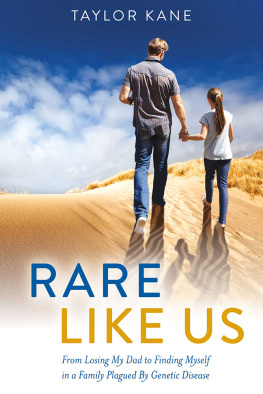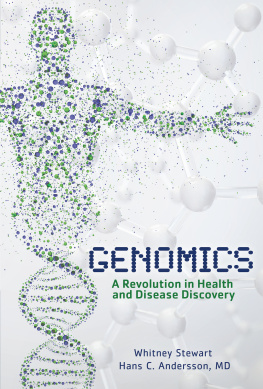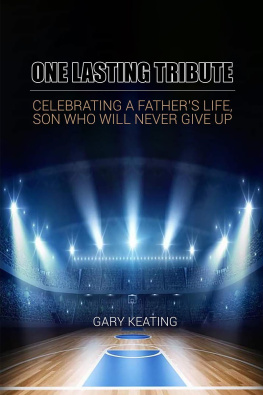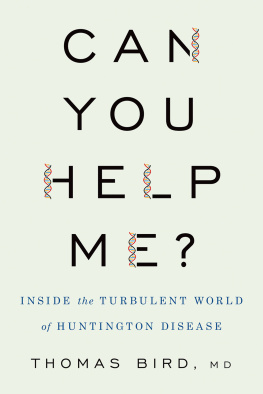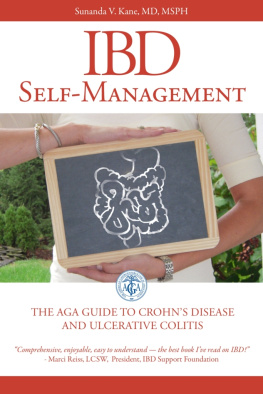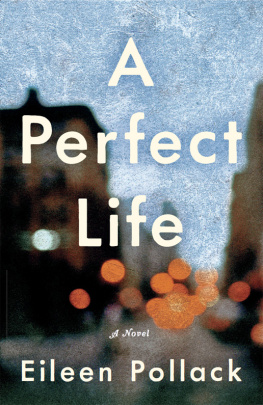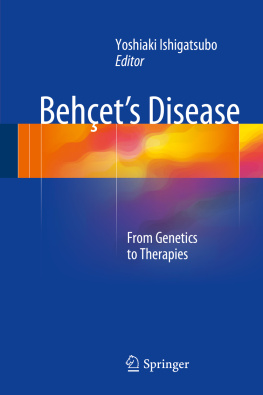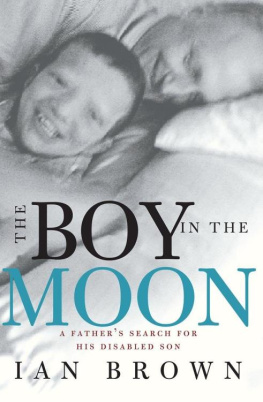Preface
Theres a website that calculates which words you use most often on Facebook. When I tried it, I discovered that the word I used most was rare. This may seem a little strange, but I cant say that it really surprised me. After all, for a twenty year old, I think Ive had a pretty rare lifeand I mean that literally. My father was diagnosed with a rare genetic disease when I was three years old and passed away from that disease when I was five. Shortly thereafter, I learned I was a carrier of the same rare disease and that I would have a fifty percent chance of passing the disease on to my children. Over the years, Ive become a fierce advocate for awareness of rare diseases, traveling across the country to speak at rare disease conferences and leading groups of rare disease patients and their families to advocate for pro-rare disease legislation on Capitol Hill. When I was eighteen years old, I founded my own nonprofit organization to unite and support female carriers of rare genetic diseases. And finally, just this year, a college friend and I started a new organization calledyou guessed itRARE, an acronym for Research-Advocate-Reform-Educate, to raise awareness of rare diseases on campus.
Now that you know where I got the title for this book, Id like to tell you why I wrote it. First, and most importantly, I felt I could help others by sharing what Ive learned growing up in a family plagued by a rare diseaseone in which I not only watched my father decline and then pass away after being ravaged both physically and mentally, but where other extended family members, including my dads identical twin brother, suffered the same or similar fates or, like me, are carriers of the deadly disease. The lessons Ive learned throughout this ordeal have helped me immeasurably in my quest to come to grips with my fathers death and move forward with my life. I believe they could benefit not only rare disease patients and their families, but anyone who has suffered the loss of a loved one or has had to face an uncertain medical future or any other type of adversity, for that matter, particularly at a young age.
Another one of my reasons for writing this book was to bring attention to the realities associated with rare diseases and the challenging issues that face the rare disease community as a whole. Since I address this topic throughout the book, I will not go into detail here except to point out that if you are interested in learning more about rare diseases or would like to find out how you can support the cause, I have included an appendix at the back of this book which lists a number of fantastic nonprofit organizations that advocate for those with rare diseases in the United States and in other countries.
Finally, I decided to write this book to honor my dadmy heroJohn Joseph Kane. My dad was born and raised in South Philadelphia. He grew up in a small row home where he shared an attic bedroom with his identical twin brother. Beginning in high school, he worked as a longshoreman, eventually paying his way through college and then law school. As a lawyer, he was a client favorite, representing working-class men and women who could not navigate the legal system themselves. My dad was down-to-earth, gregarious, kind, compassionate, and had an unstoppable sense of humor. He was a diehard fan of all of the Philadelphia sports teams. He was also an amazing father. He loved life and he died far too young.
I wish I knew more about my dads life before he was diagnosed with adrenoleukodystrophy. But sadly, most of my memories of my dad involve hospital beds and wheelchairs and feeding tubes and Hoyer lifts and catheters and hospice nurses and so on. Still, I have many happy memories of the time I spent with him during his illness. We laughed and had fun together despite all of the hardships. My dad was an eternal optimist and maintained his cheerful disposition and good humor until the very end.
Because it was important to me that this book be factually accurate, I describe many of the physical and cognitive symptoms he experienced and the manner in which they affected us as a family. While some might consider these details too private or embarrassing to be put into writing, I disagree, and I know my dad would too. Medical symptoms should not have to be hidden as shameful secrets. My dad was not his symptoms; suffering them was not his choice. Indeed, many of the greatest difficulties we confronted as a family stemmed from others who either could not face his symptoms or who pretended they didnt exist. (One word of caution to those who have adrenoleukodystrophy or have a family member with the condition: adrenoleukodystrophy manifests differently in different people. My dads experience with the disease was unique to himeven his twin brother had vastly different symptoms. Accordingly, my dads battle with this disease is not in any way predictive of anyone elses journey.)
So, how did I write this book given that I was still very young at the time many of the events occurred? To begin with, I interviewed my mother, Diane Kane, extensively. Although we had discussed many of these events on numerous occasions while I was growing up, she and I re-explored her memories in great detail and reviewed her personal diaries, as well as medical reports, legal documents, newspaper articles, and letters she had accumulated in order to corroborate her recollections. Since part one of this book relates to incidents that occurred before my sixth birthday, it contains more of my moms feelings and perceptionsexactly as she relayed them to methan it does my own. Since she served as my dads primary caregiver, I felt that including her point of view would be both illuminating and beneficial to others in similar situations. Plus, I learned a lot from her too.
In addition to my mom, I also interviewed a number of other people who were close to my dad at the time and who had specific knowledge of the material facts referred to in this book. Finally, I relied upon my own memories and my daily journal, which I have kept since I was in sixth grade. Part two of this book only includes events that I clearly remember and is essentially my personal memoir, written from my perspective as a young girl, as a teenager, and finally as a young adult.
With the exception of family members and close friends, I have changed the names of some of the individuals mentioned in this book, as well as the details of certain events, to protect anonymity.
PART ONE
In the United States, a disease is considered to be rare if it affects less than 200,000 people. Cumulatively, however, rare diseases are not really that rare. At last count there are more than 7,000 rare diseases that affect over 25 million Americans. One in every ten of us is born with some type of rare disorder. Unfortunately, the overwhelming majority of rare disorders do not have even a single FDA-approved treatment. Doctors may be unfamiliar with rare diseases they havent seen before; accordingly, there is often a significant delay before a patient is accurately diagnosed. In some cases, this delay can have devastating consequences.
Adrenoleukodystrophy, more commonly referred to as ALD, is a particularly deadly rare genetic disease that affects approximately one in every 18,000 people worldwide. It is what is known as a X-linked disease, meaning it is passed from parent to child through a defect on the X chromosome. Because males only have one X chromosome, they are typically more severely affected by the disease than females, who have two X chromosomes (one of which is unaffected and compensates for the genetic defect on the other). Often, they are diagnosed as young boys between the ages of four and ten. These previously healthy boys typically begin to exhibit behavioral problems, memory lapses, and difficulties with reading, writing, and comprehension. The disease quickly progresses as the myelin sheath in their brains deteriorates, and they experience seizures, loss of muscle control, blindness, deafness, and dementia. By this time, it is usually too late for effective treatmenta risky stem cell transplantand the disease often results in death, usually within several years of diagnosis.

